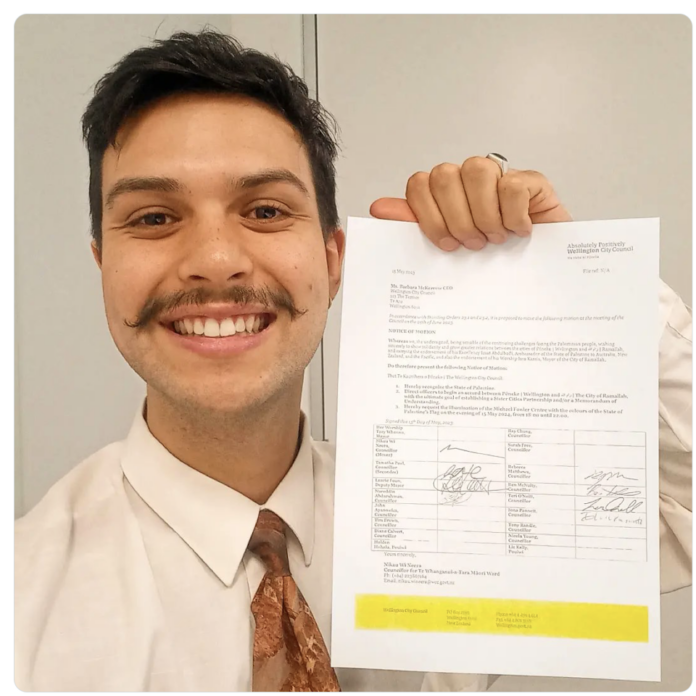For the past month Wellington Council, Te Kaunihera o Pōneke has been considering a motion to recognise the State of Palestine, and light up the Michael Fowler Centre with the colours of the State of Palestine’s flag on 15 May 2024. This marks the establishment of Israel, or what Palestinians call Nakba, meaning the catastrophe. The third part of the motion is to establish a Sister Cities Partnership with Ramallah
The first two points have since been rejected and the third motion has been downgraded to becoming a Friendly City, as the first step to establishing a Sister Cities partnership.
The Israel Palestinian conflict has been called the most intractable conflict in the world, for obvious reasons. It has been ongoing for over 75 years, at least since the establishment of the state of Israel, and the many attempts by world leaders to broker a solution between the two parties have proven futile.
Thus the proposal to establish a city sister with Ramallah, casts Wellington into the midst of a highly contentious and divisive conflict. The proposal is opposed by a significant portion of the Wellington constituency.
In addition, the original motion makes clear that the proponent of the motion, Nikau Wi Neera has adopted a faulty Palestinian narrative that does not align with historical reality.
The motion states:
The Palestinian struggle for statehood has similarities with the Māori concept of tino rangatiratanga. Palestinians share similarities with Māori in terms of having suffered land loss and their struggle for self-determination.
Wi Neera fails to recognise that Jews are the indigenous people of the lands of Judea and Samaria. It is in Israel that the distinctive Jewish culture and religion developed over three millennia ago. Strong connection to land and ancestors has been maintained over this period, and is further confirmed by archeological, literary and genetic evidence. Even though many colonisers came to dispossess the Jews of their ancestral lands, there always was a remnant keeping ahi kaa.
- The Palestinian struggle for statehood has few similarities with the experience of Māori. The Palestinians never had rangatiratanga of the land, as did Māori. The land had been in Ottoman hands for 400 years until the end of WW1.
- The Palestinians have never been willing to make peace or make a treaty, as have Māori.
- Palestinian identity is a recent development, dating from the 1960s under Yasser Arafat. Prior to this, most Palestinians saw their allegiance firstly to the wider Arab nation. Not so, Māori.
- Many Arabs lost their land as a result of the 1948 war, but 20% of Arabs chose to stay. (Many became full citizens of Israel and now enjoy rights and freedoms unavailable in any Arab country). The reasons for land loss were multifarious. While some were forced to flee for military reasons, the Arab Higher Command was also urging them to leave, while they set out to destroy the Jewish state.
- A similar number of Jewish refugees were created as a result of Israel’s 1948 defensive war, and were forced to flee Arab lands where their ancestors had lived for centuries. These refugees are seldom mentioned in the popular narrative.
In addition to the faulty premise upon which this resolution is based, I would question how much Wellington has in common with Ramallah. The Palestinian Authority has an appalling human rights record, including the following:
- the torture and killing of members the LGBTQ community
- the persecution of Christians
- the strong likelihood that Jews would be lynched if found in Palestinian controlled territories
- femicide and the absence of a law to protect women from domestic violence
- deep corruption in the government
- the glorification of terror and Jew-hatred.
Are these really the values with which Wellington wishes to align? I hope the Wellington City Council will undertake further research from both sides, to truly understand the situation in all its complexity.



